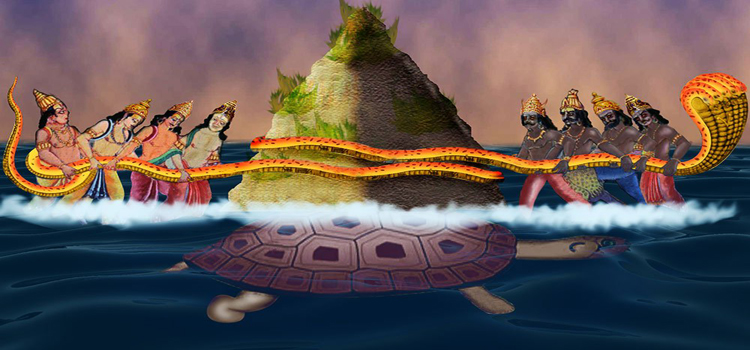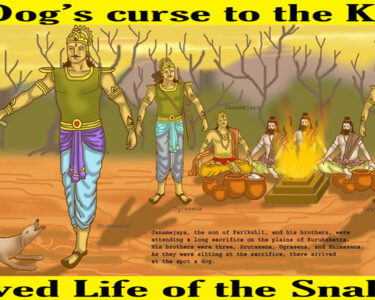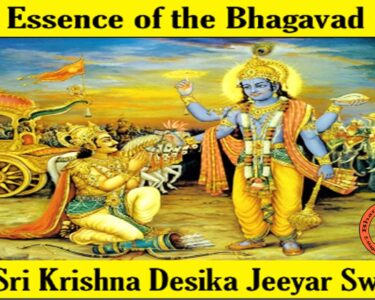“Soota said, ‘There is a mountain called Mandara adorned with cloud-like peaks. It (Mandara) is the best of mountains, and is covered all over with intertwining herbs. There countless birds pour out their melodies, and animals of prey roam about. Devas, Apsaras and Kinnaras visit the place (Mandara mountain). Upwards it rises eleven thousand yojanas (1 yojana = 10.8 km to 13.2 km; therefore 11,000 yojanas equals 118,800 km), and descends downwards as much (11,000 yojanas). Devas wanted to tear it (Mandara mountain) up and use it as a churning rod (to churn the ocean) but failing to do so same went to (Lord) Vishnu and (Lord) Brahma who were sitting together, and said to them, ‘O Devas (Lord Vishnu and Lord Brahma), devise some efficient scheme, to consider how Mandara (mountain) may be dislodged for our good.’
“Soota continued, ‘O son of Bhrigu (Shaunaka)! (Lord) Vishnu with (Lord) Brahma accepted to it. The lotus-eyed one (Lord Vishnu) gave the hard task on the mighty Ananta (snake or Naagaa), the prince of snakes. O Brahmana (Shaunaka), the powerful Ananta (Naagaa), directed to that place both by (Lord) Brahma and (Lord) Narayana, tore up the mountain with the woods on that and with the denizens of those woods. Devas came to the shore of the Ocean with Ananta (Naagaa) and addressed the Ocean, saying, ‘O Ocean; we have come to churn your waters for obtaining Amrita.’
“The Ocean replied, ‘Be it so, as I shall not go without a share of it. I am able to bear the huge agitation of my waters set up by the (Mandara) mountain.’ Devas then went to the king of tortoises and said to him, ‘O Tortoise-king, you will have to hold the mountain on your back!’ The Tortoise-king agreed, and (Lord) Indra arranged to place the mountain on the former’s (tortoise’s) back.
“Devas and Asuras made of Mandara (mountain) a churning staff and Vaasuki (Naagaa) the cord, and set about churning the deep for Amrita. Asuras held Vaasuki (snake) by the hood and Devas held him by the tail. Ananta (Naagaa), who was on the side of Devas, at (regular) intervals raised the snake’s hood and suddenly lowered it. In consequence of the stretch Vaasuki received at the hands of Devas and Asuras, black vapours with flames issued from his mouth. These, turned into clouds charged with lightning, poured showers that refreshed the tired Devas. Flowers that also fell on all sides of Devas from the trees on the whirling Mandara (mountain), refreshed them.
“O Brahmana (Shaunaka), then out of the deep came a tremendous roar like to the roar of the clouds at the Universal Dissolution. Various aquatic animals being crushed by the great (Mandara) mountain gave up the soul in the salt waters (of the ocean). Many denizens of the lower regions and the world of Varuna were killed. Large trees with birds on the whirling Mandara were torn up by the roots and fell into the water. The mutual friction of those trees also produced fires that blazed up frequently. The (Mandara) mountain thus looked like a mass of dark clouds charged with lightning. O Brahmana (Shaunaka), the fire spread, and consumed the lions, elephants and other creatures that were on the mountain. Then (Lord) Indra extinguished that fire by pouring down heavy showers.
“O Brahmana (Shaunaka), after the churning had gone on for some time, gummy discharges of various trees and herbs filled with the properties of Amrita mingled with the waters of the Ocean. Devas attained to immortality by drinking of the water mixed with those gums (Rasaa in Sanskrit) and with the liquid extract of gold. By degrees, the milky water of the agitated deep (ocean) turned into clarified butter by virtue of those gums and juices. But Amrita did not appear even then. Devas came before the boon-granting (Lord) Brahma seated on His seat and said, ‘Lord Brahma, we are spent up, we have no strength left to churn further. Amrita has not yet arisen so that now we have no resource except (Lord) Narayana.’
“On hearing them, (Lord) Brahma said to (Lord) Narayana, ‘O Lord, come down to grant Devas strength to churn the deep (ocean) afresh.’
“Then (Lord) Narayana agreeing to grant their various prayers, said, ‘O wise ones (Devas), I grant you sufficient strength. Go, put the mountain in position again and churn the water.’
“Re-established thus in strength, Devas recommenced churning. After a while, the mild Moon (Soma in Sanskrit) of a thousand rays emerged from the Ocean. Thereafter sprung forth (Devi) Lakshmi dressed in white, then Soma, then the White horse (Uchchaihshravas), and then the divine gem Kaustubha which graces the chest of (Lord) Narayana. Then Lakshmi, Soma and the horse, fleet as the mind, all came before Devas on high. Then arose the divine Dhanvantari himself with the white vessel of nectar (Amrita in Sanskrit) in his hand. Seeing him (Dhanvantari), the Asuras set up a loud cry, saying, ‘It be ours.’
“At length rose the great elephant, Airaavata, of huge body and with two pair of white tusks. It was taken by (Lord) Indra, the wielder of Vajra. But with the churning still going on, the poison Kaalakuta appeared at last. Surrounding the Earth it (Kaalakuta poison) suddenly blazed up like a fire attended with fumes. By the scent of the fearful Kaalakuta, the three worlds were shocked. Then (Lord) Shiva, being requested by (Lord) Brahma, swallowed that (Kaalakuta) poison for the safety of the creation.
“The divine Maheshwara (Lord Shiva) held it (Kaalakuta poison) in His throat, and it is said that from that time He is called Neelakanta (blue-throated). Seeing all these wonderful things, the Asuras were filled with hopelessness, and got themselves prepared for entering into hostilities with Devas for the possession of (Devi) Lakshmi and Amrita. Immediately, (Lord) Narayana called His mesmerising Maayaa (illusive power) to His aid, and assuming the form of an attractive female, flirted with the Daanavaas (Daityas and Daanavaas are two different clans of Asuras). The Daanavaas and the Daityas charmed with her intense beauty and grace lost their reason and unanimously placed the Amrita in the hands of that fair lady.’”
SRIMAD MAHABHARATA – AADI PARVA – AASTIKA (UPA) PARVA – PART 18 – SAMUDRA MANTHAN



